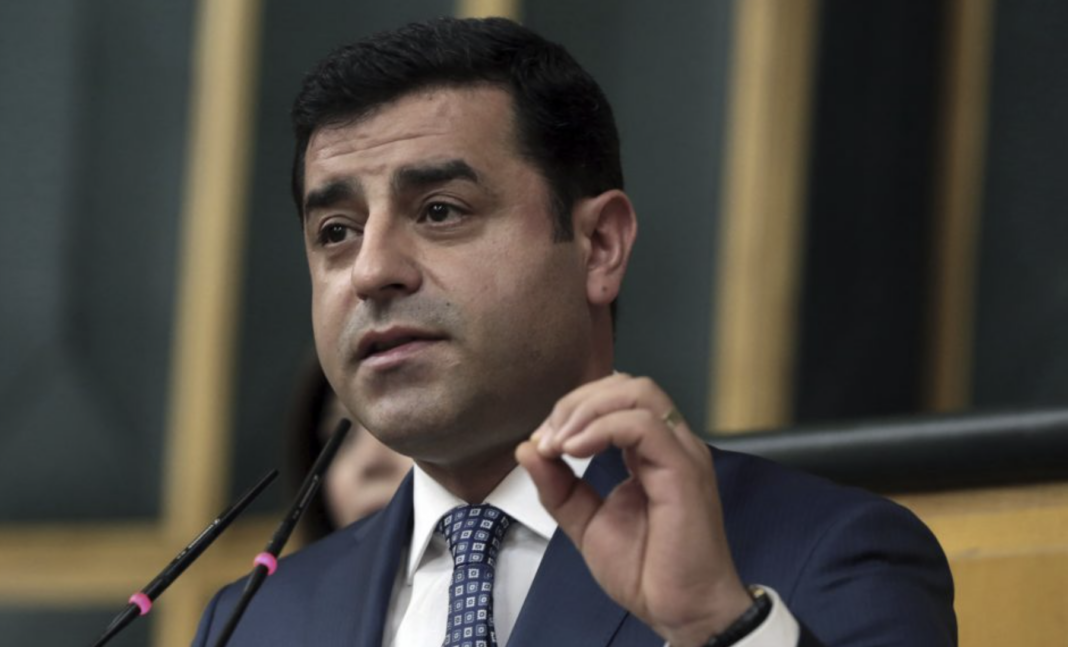Ekathimerini, June 4, 2024, by George Monastiriakos*
On May 16, 2022, the Ankara 22nd Assize Court sentenced Selahattin Demirtas, former leader of the Peoples’ Democratic Party (HDP) and the most popular Kurdish politician in Turkey, to an excessive and lengthy 42 years in prison.
To secure Demirtas’ conviction, the prosecution relied on evidence which included two political speeches from 2016 and tweets from 2014 calling on the HDP’s supporters to protest against what they perceived as the Turkish government’s support for the Islamic State in Iraq and the Levant’s (ISIL) siege of Kobane, a Kurdish-majority town across the border in Syria.
Thirty-seven people were killed. Hundreds were injured. Most were supporters of the HDP.
In the years after the protests, the HDP, once Turkey’s third biggest political party, was systematically dismantled for its alleged connections to the Kurdistan Workers’ Party (PKK), a militant group designated as a terrorist organization by the United States, Canada, the European Union, and Turkey. This included attempting to ban 451 HDP politicians from participating in politics for half a decade.
For his part, Demirtas was arrested in 2016 and held in pretrial detention. Two years later, the European Court of Human Rights (ECHR) ruled that his detention had the “ulterior purpose of stifling pluralism and limiting the freedom of political debate” in Turkey and ordered his “immediate release.” It did the same in 2019 and 2020.
Rather than complying with these rulings, a Turkish court sentenced Demirtas to three and half years in prison for “insulting the president.” This provided Turkey with the cover it needed to avoid enforcing the ECHR’s legally binding decision.
As a longtime member of the Council of Europe (COE), and an EU candidate, Turkey has ratified the European Convention on Human Rights, accepts the court’s jurisdiction, is legally bound by the ECHR’s decisions, and has historically enforced its orders. Yet Ankara’s lawfare against the Turkish opposition doesn’t begin or end with Demirtas. Far from it.
Consider the case of Osman Kavala, a Turkish human rights activist who was arrested in 2017. First, he was falsely accused of “attempting to overthrow the government” in relation to the 2013 Gezi Park protests. Then, of “attempting to overthrow the constitutional order” for allegedly instigating the failed 2016 coup attempt against President Recep Tayyip Erdogan.
In 2019, the ECHR reviewed all the accusations against Kavala. It found no evidence that supported the charges against him and called for his immediate release. The court also determined that the litigation was meant to “silence [Kavala] as an NGO activist and human rights defender, to dissuade others from taking part in such activities and to paralyze Turkey’s civil society.”
Nevertheless, a Turkish court sentenced him to life in prison without parole for “attempting to overthrow the government” in April 2022. Three months later, the ECHR ruled that nothing had changed since it reviewed the case in 2019 and, again, ordered Turkey to release Kavala. Rather than releasing him, however, the Turkish Court of Cassation upheld Kavala’s life imprisonment on appeal.
By blatantly disregarding the ECHR’s legally binding order to release Kavala, Turkey, our NATO ally, became only the second member-state of the court (after Azerbaijan in the Mammadov case) that had infringement proceedings brought against it. To say that this weakens the rule of law and tramples on human rights is an understatement.
Yet Ankara’s lawfare against the Turkish opposition goes further still.
Consider the case of Ekrem Imamoglu. In March 2019, he was elected mayor of Istanbul against the Justice and Development Party’s (AKP) candidate Binali Yildirim. The AKP challenged the outcome of the race. The Supreme Election Council (YSK) canceled the result and ordered a new vote. Imamoglu won, again, with an even bigger margin, in the second round.
Fast-forward four years. In December 2022, six months before the 2023 presidential elections, a Turkish Court sentenced Imamoglu to nearly three years in prison. It also banned him from running against Erdogan for the presidency. The charge against Imamoglu? Allegedly “insulting the judges” of the YSK in a victory speech after he was elected as mayor of Istanbul in 2019.
None of this should come as a surprise to anyone who has paid attention. Turkey’s judicial independence is, to paraphrase Freedom House, “severely compromised.” After all, thousands of judges and prosecutors have been replaced with AKP loyalists since the 2017 constitutional referendum consolidated power in the executive branch of government at the expense of the judiciary and legislature.
With all of that in mind, this much is certain: Ankara will continue using the law to silence critics and settle political scores with the Turkish opposition. Bet on it.
* George Monastiriakos is an adjunct professor of law at the University of Ottawa. Read his works at www.Monastiriakos.com. Follow him on X @Monastiriakos.

